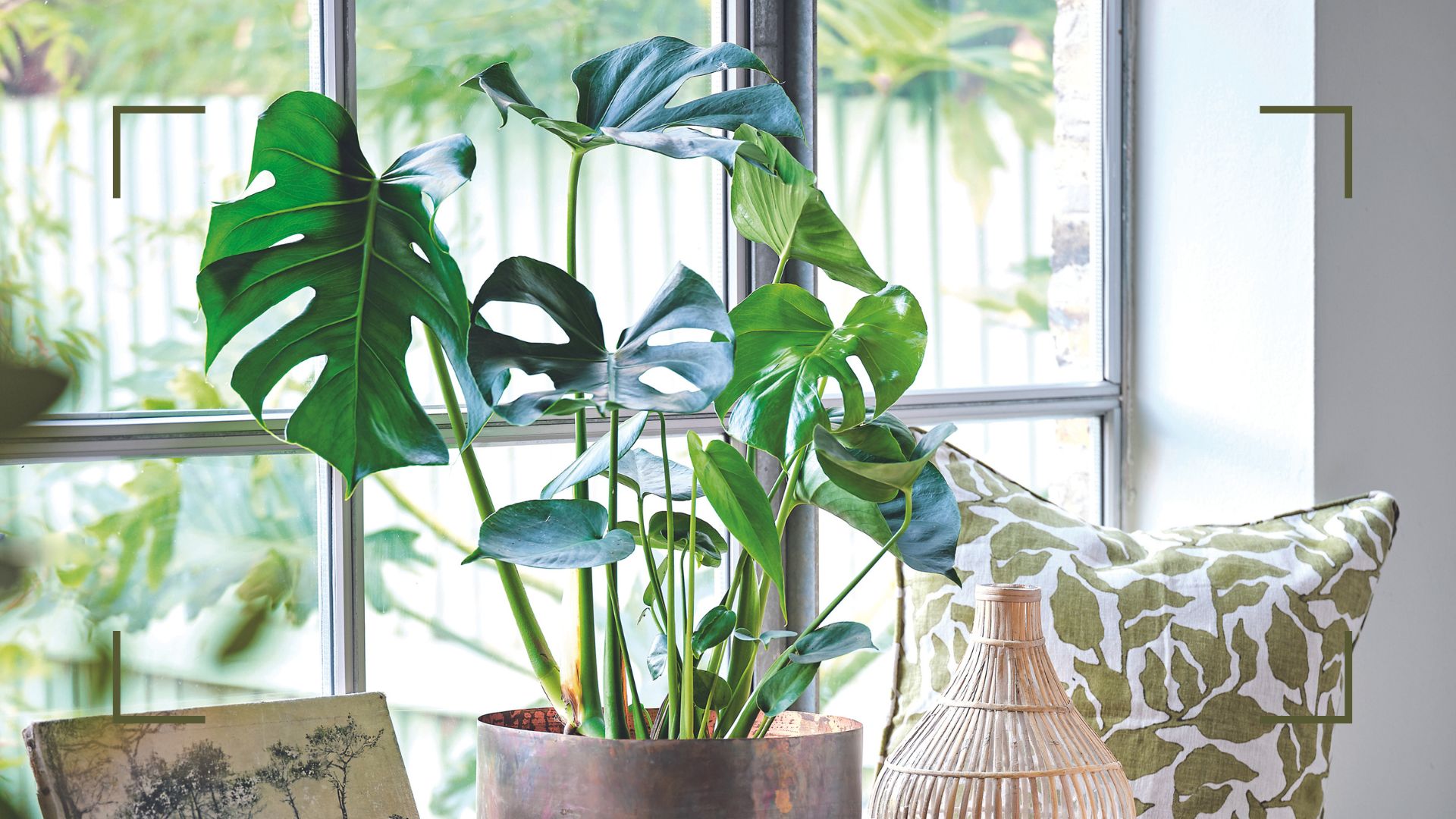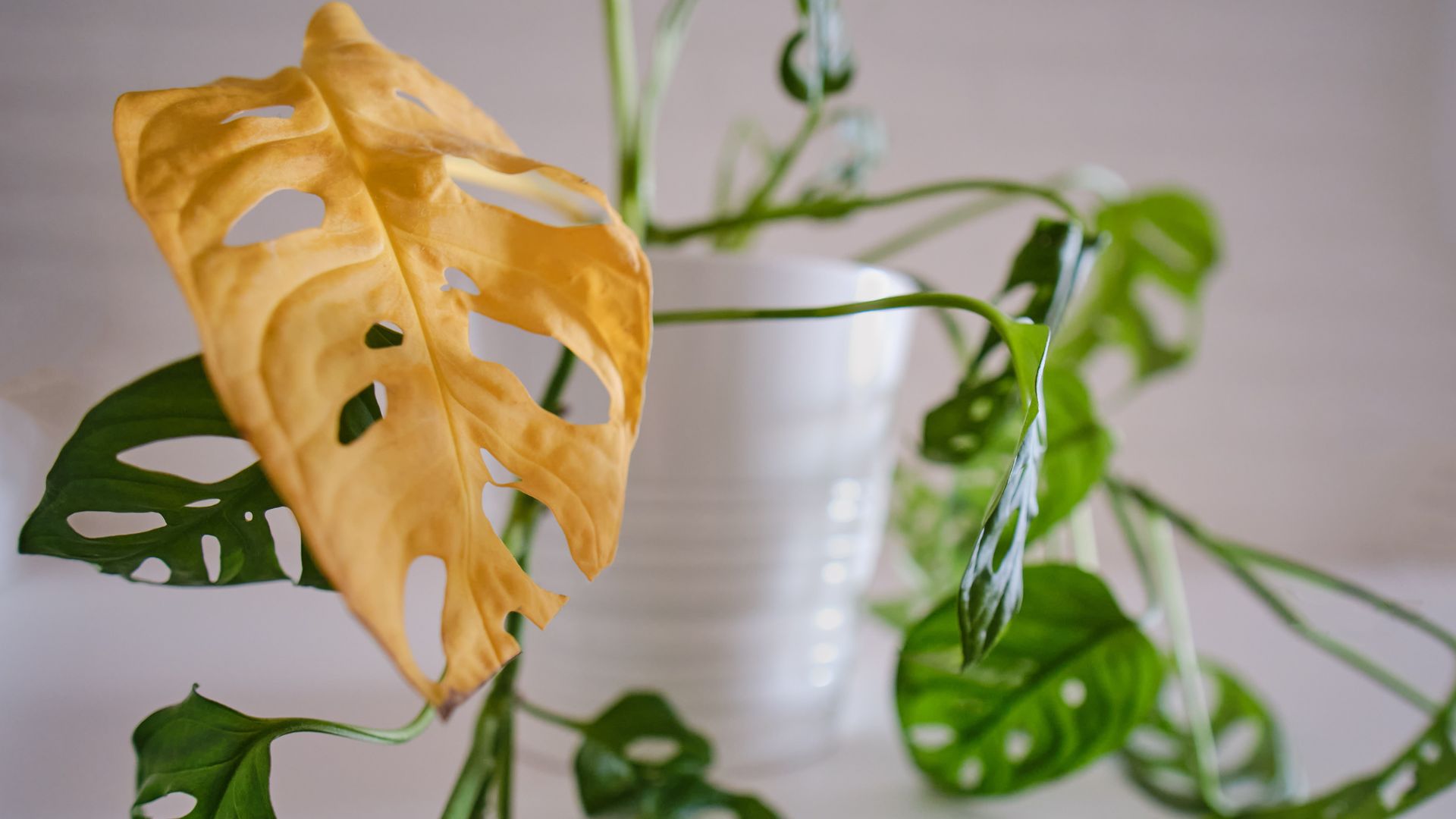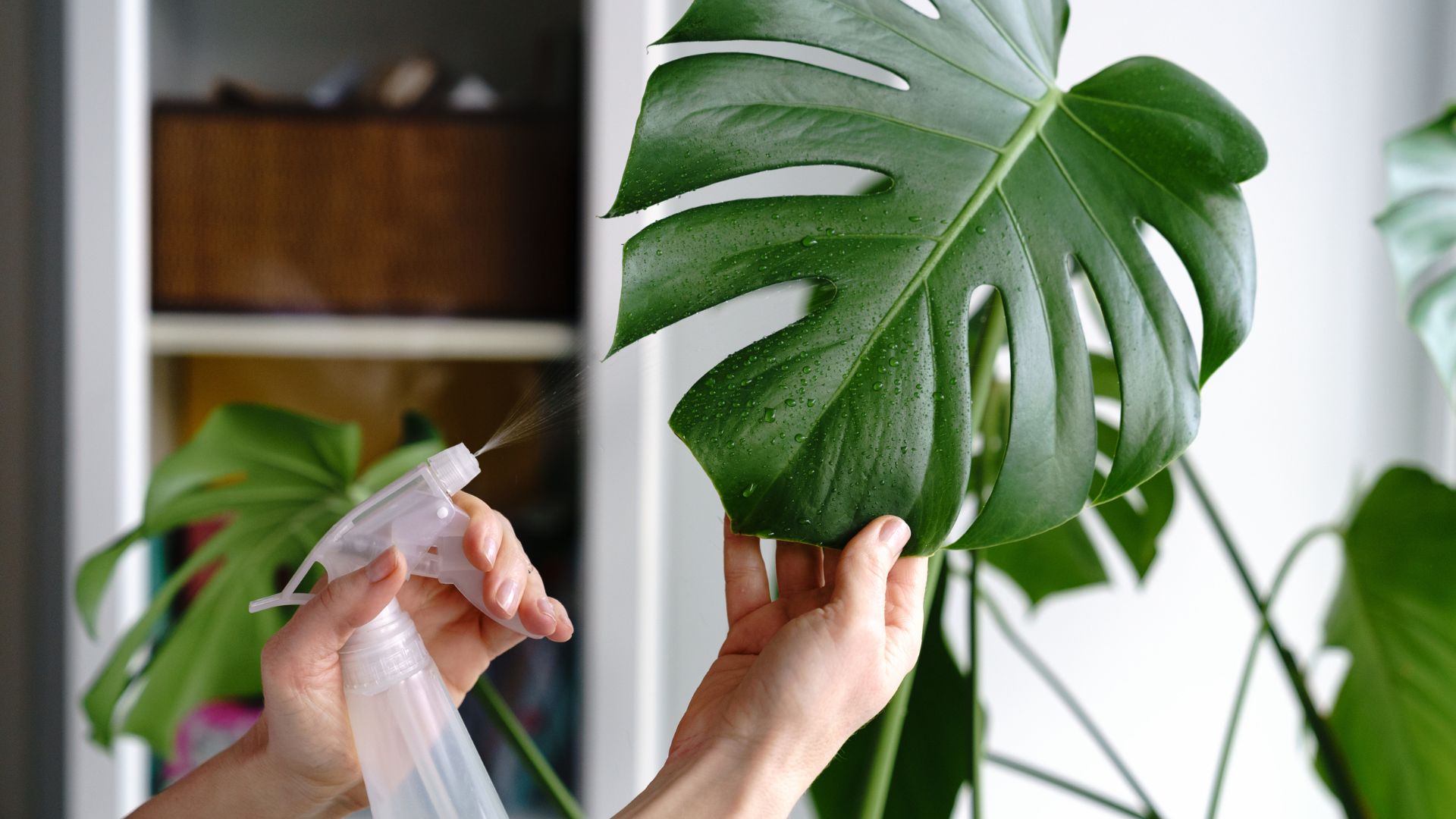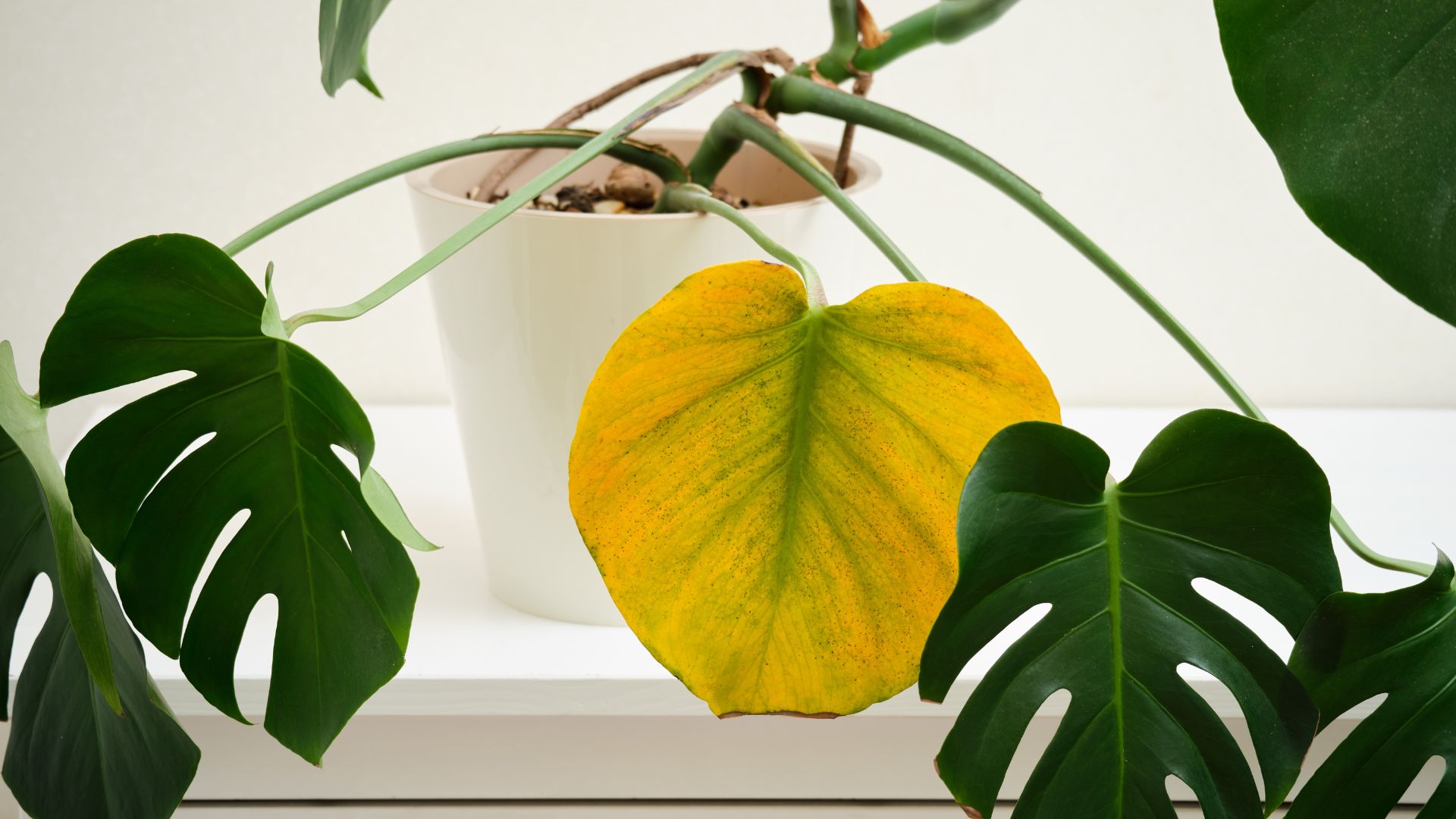
Left wondering 'why are my monstera leaves turning yellow?' Even when we think we've covered all bases in caring for our plants, their leaves can hint at the contrary.
Seasoned plant parent or not, everyone makes the most common houseplant mistakes from time to time. It can be a matter of forgetting to water your monstera once and the next day you have to watch in horror as the yellow creeps up its leaves and stalks, a similar horror story to that of monstera tips turning brown.
To help avoid this plant tragedy we asked horticulturist experts to explain why monstera leaves turn yellow, how we can avoid it and what we can do about it once the yellowing occurs.
Why is my Monstera turning yellow?
If found yourself wondering why your peace lily leaves are turning yellow then you might be well equipped to deal with the same issues on your monstera plant. Similar to the peace lily there are several reasons why your monstera might be struggling, from too much sunlight exposure to a lack of nutrients.
Here are all the possible problems that could be causing your plant distress according to the experts...
1. Incorrect watering

Whether it's one of the easiest houseplants to care for or one of the hardest houseplants to keep alive one of the most common errors that everyone makes is messing up our watering schedule. Whether you forget to water your plants or get a little bit carried away and overwater your monstera leaves will soon turn yellow either way.
"This is the most common reason that a plant would turn yellow as people can get stuck in a set routine of watering their plants, rather than adapting the watering to the needs of the plant," says Keira Kay, Bloom & Wild plant expert.
She explains that the plant can essentially suffocate which will stop delivering nutrients and water to the rest of the plant, which will of course quickly affect the leaf health and lead to them dying off.
Keira says, "In the growth season fast growing plants will use up water quickly, so ensure you are regularly checking the plant's soil to determine if it needs a top-up."
2. Incorrect location
Knowing where to place your monstera is just as important as knowing how to clean plant leaves, the placement of your plant in any room can determine whether it thrives or not.
Speaking to brand manager at Prestige Flowers Millie Durbak, she says, "If your monstera plant is turning yellow, it could be due to exposure to direct sunlight or even from a lack of sufficient airflow around the plant."
Making sure there is proper ventilation in the room will prevent stagnant air around the monstera which will promote optimal growth conditions. As well as airflow, be careful where you're placing the monstera within a room as direct sunlight can also be the root cause of yellowing.
3. Pests

It's one thing knowing how to get rid of flies in your house and another knowing how to find pests crawling and eating away at your houseplants. Several types of pests could be taking over your monstera plant, all of which can be the cause of yellowing leaves.
"Plant pests such as spider mites suck sap from the leaves of houseplants. If your Monstera has an infestation this could be causing the leaves to turn yellow as they are drained of their moisture," says professional gardener at MyJobQuote Fiona Jenkins.
Without this moisture the leaves will then become stressed, turning yellow and eventually dying. It's the same reason why your orchid leaves may be turning yellow too.
4. Pot bound roots
Similar to why your peace lily tips may turn brown, there is much to be found in the roots of your plant. Whether the roots of your plants are waterlogged, rotted or completely dried out, your leaves are a great indicator of trouble underneath.
Fiona explains, "Your Monstera plant may have outgrown its pot resulting in the roots becoming compacted. This means they are not able to absorb water or nutrients from the soil causing yellowing of the leaves."
It's a good idea to keep an eye on the roots of your plant as well as its leaves and stem, more often than not the roots can warn you about an upcoming issue way before any other part of the plant will.
5. Natural ageing

As one of the best indoor plants for your health and well-being, monstera are a welcomed long-term addition to any plant collection. Whilst they do require maintenance and care, they're considered to be quite a durable long-lasting plant which means that they are susceptible to natural ageing.
Fiona is quick to point out that as your plant ages, some of the older leaves will naturally turn yellow. She says, "These tend to be at the base of the plant, and it is perfectly natural. Provided the rest of the plant is still putting out new growth there’s nothing to worry about."
FAQ
How do you fix yellow leaves on a monstera?
Depending on why your leaves are yellowing in the first place there is various steps you can take to stop further yellowing, however, once a leaf has yellowed there is unfortunately no way to bring it back to its former green self.
Fiona says, "If incorrect watering is the problem, make sure to only water when the top two inches of the soil are dry. Rather than sticking to a rigid watering routine, only water the monstera when it needs it. This will change with the seasons, so it will need less water in the winter."
As for incorrect positioning and light levels, you'll need to closely watch your plant to see if its current placement is suitable enough for it to thrive. Should the plant be lacking natural indirect sunlight Fiona suggests moving it immediately into another spot.
Pests are a different ball game and should be dealt with as soon as they are spotted, if not there is a good chance the infestation will spread further and even affect other plants you have.
Fiona says, "Use a mixture of neem oil in water and apply it to a cloth. Wipe the leaves of the Monstera with the solution. You can do this every seven days until the pests are eliminated."
How to prevent monstera leaves yellowing?
When it comes to prevention, it's as simple as knowing how to care for your plants. To ensure that no yellowing takes place then providing the plant with all the conditions that it needs to thrive is the best way, specifically keeping on top of its weekly maintenance.
As mentioned above, knowing why the leaves are turning yellow in the first place will be crucial in preventing it from happening at all. Whether that means ensuring it's properly watered, it has sufficient sunlight or has been successfully treated for pests.
Should I cut yellow leaves off my Monstera?
When a lower leaf has turned as the plant ages Fiona says it's safe to cut these off as soon as more than half of the leaf has yellowed. She says, "A yellow leaf is lacking chlorophyll which is necessary for photosynthesis. If the leaf cannot photosynthesize then it is not contributing to the health of the plant."
To cut a yellow leaf we recommend using a clean pair of sharp shears and cutting as close to the bottom of the stem as possible. We've found a great pair of plant shears on Amazon for £5.99.
Although it's not quite as demanding as knowing how to care for an orchid, monstera leaves are sensitive to lack of care and will show you the moment they begin to struggle. The key to maintaining a happy and healthy monstera is keeping on top of its care routine whilst always ensuring it has everything it needs to thrive.







